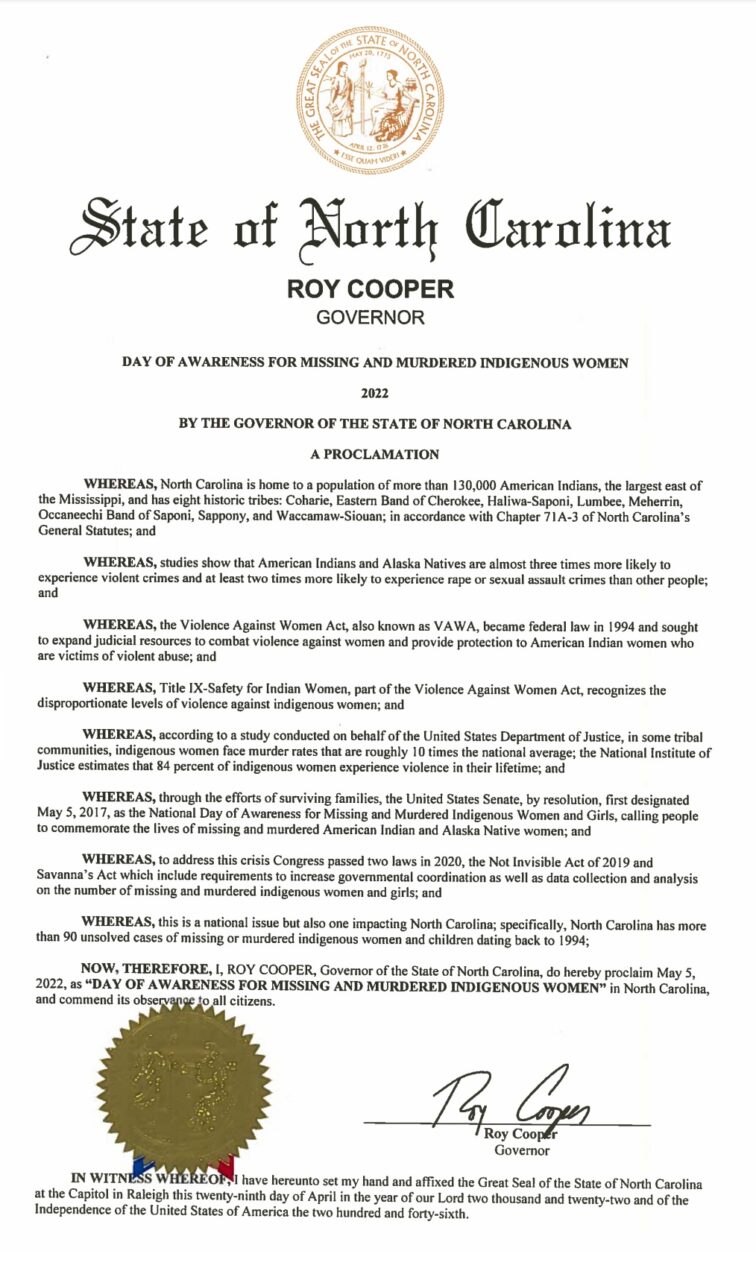Missing and Murdered Indigenous Women (MMIW)
The issue of Missing and Murdered Indigenous Women (MMIW) is a tragic reality that affects many Indigenous communities in North Carolina, including the Meherrin Indian Tribe. These cases involve the disappearance or death of Indigenous women, and girls, and they are often linked to systemic issues such as colonialism, racism, and gender-based violence.
The Meherrin Indian Tribe recognizes the seriousness of this issue and is committed to raising awareness about it in our community and beyond. We support efforts to bring attention to MMIW and to address the underlying causes that contribute to these cases, such as poverty, discrimination, and lack of access to resources.
As a Tribe, we also want to honor the lives of those who have gone missing or been murdered and to support their families and loved ones in their search for justice. We stand in solidarity with other Indigenous communities across North Carolina and the United States who are working to address this issue and ensure that Indigenous women, and girls are valued, protected, and treated with respect and dignity.
We encourage everyone to learn more about MMIW and to support organizations and initiatives that are working to raise awareness and seek justice for missing and murdered Indigenous women, and girls. Together, we can make a difference and work towards a future where all Indigenous people are safe, valued, and respected.
Indigenous people are at a disproportionate risk of experiencing violence, murder, and make up a significant portion of the missing and murdered cases.
- A 2016 study by the National Institute of Justice (NIJ) found that more than four in five American Indian and Alaska Native women (84.3 percent) have experienced violence in their lifetime, including 56.1 percent who have experienced sexual violence.
- In the year leading up to the study, 39.8 percent of American Indian and Alaska Native women had experienced violence, including 14.4 percent
who had experienced sexual violence. - Overall, more than 1.5 million American Indian and Alaska Native women
have experienced violence in their lifetime. - The murder rate of Indigenous women is three times higher than non- Native women. It is the third leading cause of death for Indigenous women
The Meherrin Indian Tribe supports the complete and thorough implementation of Savanna’s Act.
Savanna’s act was named after Savanna Lafontaine-Greywind, who was murdered in 2017 at 22 years of age.
S.227 – Savanna’s Act: Became Public Law No: 116-165 on Oct. 10, 2020. This bill directs the Department of Justice (DOJ) to review, revise, and develop law enforcement and justice protocols to address missing or murdered Native Americans.
In short, the bill requires DOJ to:
- provide training and technical assistance to tribes and law enforcement agencies;
- develop and implement the National Missing and Unidentified Persons System;
- conduct outreach to tribes, tribal organizations, and urban Indian organizations;
- develop guidelines for response to missing and murdered case;
- report statistics on missing or murdered Native Americans.
The Meherrin Indian Tribe supports the complete and thorough implementation of the Not Invisible Act
S.982 – Not Invisible Act of 2019: Became Public Law No: 116-166 on Oct. 10, 2020. This bill increases the coordination of efforts to reduce violent crime within Indian lands and against Indians.
Specifically, the DOI must designate an official within the Bureau of Indian Affairs to coordinate prevention efforts, grants, and programs related to missing Indians and the murder and human trafficking of Indians.In addition, the DOJ must (1) establish a joint commission on violent crime within Indian lands and against Indians, and (2) submit a written response to the recommendations developed by the joint commission.The joint commission must develop and make publicly available recommendations to the Interior and DOJ on actions to combat violent crime against Indians and within Indian lands, identify, report, and respond to instances of missing persons, murder, and human trafficking.The Meherrin Indian Tribe supports the new Missing & Murdered Unit (MNU).
New MMIW Unit
Read more about the new Missing & Murdered Unit (MMU) within the Bureau of Indian Affairs Office of Justice Services (BIA-OJS) in the Call For Justice Is Answered By New MMIW Unit, a measure taken by Secretary of Interior Deb Haaland to form the unit. She noted that far too often murders and missing cases involving Indigenous women, and girls unsolved and unaddressed.
Resource Guide
Albemarle Hopeline
24-Hour Crisis Line: (252) 338-3011
Justice Ministries
Hotline: (888) 222-9182
Nation Alliance on Mental Health
Hotline: (800) 451-9682
Text the Helpline at (919) 999-6527
National Domestic Violence Hotline
Hotline: (800) 799-7233
Text the word “START” to 88788
National Human Trafficking Hotline
Hotline: (888) 373-7888
Text the Helpline at: 233733
National Runaway Safeline
Hotline: (800) 786-2929
North Carolina Coalition Against Domestic Violence
PH: (919) 956-9124
North Carolina Victim Assistance Network
PH: (800) 348-5068
Project Flight
PH: (888) 373-7888
Stronghearts Native Helpline
PH: (844) 762-8483
Text the Helpline at: (844) 762-8483
Governor Cooper Proclaims Day of Awareness for missing and Murdered Indigenous Women 2022

